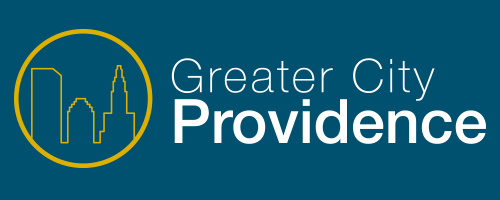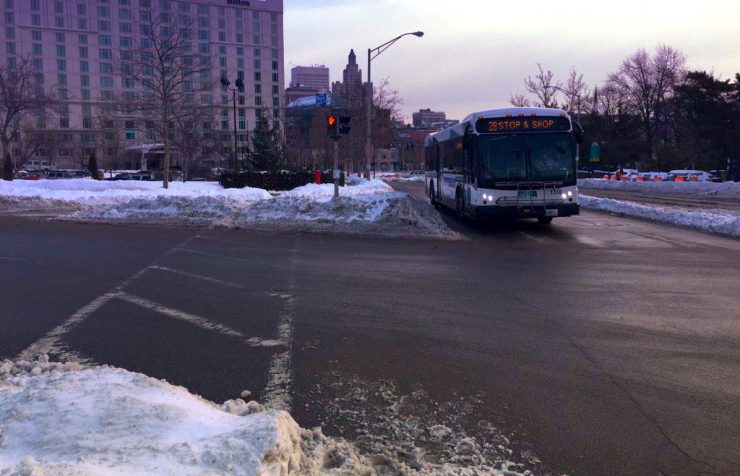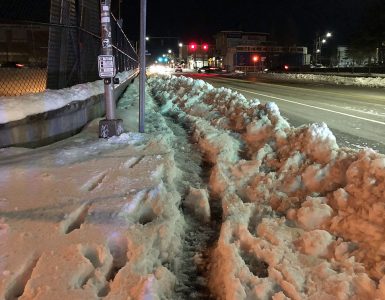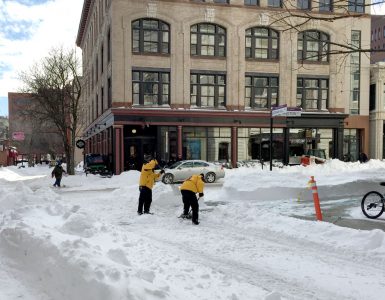![]() There’s been a lot of lip-service to forcing people to clear sidewalks through fines, but not too much seems to be coming of it. I’ve argued a lot about the safety issues involved in not clearing the sidewalks, especially for young children forced to walk in the road on the way to school; but few results have been seen.
There’s been a lot of lip-service to forcing people to clear sidewalks through fines, but not too much seems to be coming of it. I’ve argued a lot about the safety issues involved in not clearing the sidewalks, especially for young children forced to walk in the road on the way to school; but few results have been seen.
So, what about the economic impact? Should a city and state that claims to want to attract millennials who seek walkable transit-oriented small cities look like this?
Francis at the @RIPTA_RI stop across from @ProvPlaceMall looks great, ???? on that crosswalk. #PVDsidewalks pic.twitter.com/r41H8KH7BQ
— \(^o^) / (@metarkest) February 6, 2015
And here is the sidewalk I reported to ProvConnex on Jan 30. Canal St. #pvdsidewalks @Jorge_Elorza pic.twitter.com/GE80kuR3zm
— Patrick Laverty (@plaverty24) February 6, 2015
Smith Street – where pedestrians go to play Russian roulette with passing cars. #PVDsidewalks pic.twitter.com/OBYfENdN9b
— \(^o^) / (@metarkest) February 6, 2015
When I get across the Broadway bridge then what? #PVDsidewalks pic.twitter.com/57xGmUrngu
— Gr. City Providence (@gcpvd) February 5, 2015






My wife was pregnant with our first child during the winter of 2010-2011, which had several big snowfalls. We don’t own a car. She commuted via RIPTA and MBTA to Boston, and the unshoveled icy sidewalks were a tremendous hardship. I won’t say it’s the only reason or the biggest reason we left RI by any means, but it was one of the reasons we left. There’s a hostility to pedestrians in RI that’s really appalling.
Does it strike anyone else as odd that the city relies on homeowners, some of whom are physically unable to shovel snow, as their primary workforce for snow removal from sidewalks? While they are technically private property, city ordinances prevent homeowners from making any modifications to them – you aren’t even allowed to repair them – without a permit.
Imagine if the city relied on homeowners to clear the snow in the roadway in front of their homes as well. Why does the roadway get treated one way and the sidewalk another? Because we prioritize vehicle transportation? Even so, why is it then my responsibility to ensure safe passage for the rest of the citizenry? Identifying and removing hazards to navigation and commerce has been one of our government’s primary responsibilities since its founding. I see no distinction between the part of the travel corridor that is designated for vehicles and that part which is designated for pedestrians, except the fact that it is nominally private property. However, property that can’t be altered, built upon or over, improved, or removed is hardly private, and the city should stop treating it as such and fulfill its responsibility of removing snow from sidewalks.
No matter how diligent the city is in handing out tickets, they’ll never get 100% compliance. Take me, for instance. I’m currently recovering from surgery and unable to shovel. That means I won’t be able to clear my neighbor’s sidewalk, either. She’s 92, and as spry as she is, she would never be able to get out and clear her own walk.
I’m all for the noble idea that we all take ownership of our city and pitch in to do our part, but if we want to see clear sidewalks, we need to have the city clear them and stop shifting the blame to homeowners.
http://www.citylab.com/cityfixer/2015/02/a-community-approach-to-clearing-snow-from-sidewalks/385173/?utm_source=SFTwitter
The hostility towards pedestrians and transit users mostly stems from socio-economic and urban suburban divisions. Many who own cars and drive feel entitlement and superiority over those who don’t own cars or drive. If you walk, bike, or take the bus, it’s often presumed that there’s something wrong with you.
Another economic cost is when people drive (and thus export energy dollars) because they cannot safely walk. This happens to me.
State and city agencies , law enforcement, businesses, Ripta, Lamar (the bus shelter builder) adjacent property owners, plow operators, and politicians have long passed the buck on this.
However, progress. RIPTA says their arrangement with Lamar for them to clear snow from the 25 busiest shelters is working, and in Providence the Mayor’s exhortation (and threats?) seem to help – on a Friday bus ride on Smith St I saw significantly more cleared sidewalks in Providence than I remember in previous years and more cleared than in North Prov where our Mayor said he was “uncomfortable” enforcing snow ordinances. However, complaints are increasing so he is reportedly looking into acquiring sidewalk snow clearing machinery, apparently needed even for sidewalks alongside Town property such as Evans Field on Smith St that are totally blocked.
Credit to those who cleared anyway, in North PVD this includes Citizens Bank, Rite Aide, RIC, Christensen’s Dairy , Rossi’s Deli, Dave’s Furniture, St James Episcopal. However, many businesses piled up snow from their private parking lots onto the public sidewalks, no doubt blocking access for a very long time to come. This should be ticketed, perhaps after one warning.
There are bills in the Assembly to charge RIDOT with clearing snow from state highway overpasses, and a study commission to look at snow removal from roads. I expect all this to be discussed at the RIDOT Roundtable with advocates scheduled on Feb 12. Lets keep the pressure on for progress, there is such a long way to go.
On a related note, I’ve been looking at how over-attention to street clearing may actually be leading to speeding on our streets. There’s not a 1-to-1 relationship here, as there are issues related to the grade of hills, and certain fast roads (like I-95) that are expected to get a different kind of use, but for many city streets, it would help pedestrians if we did less salting on the road in order to encourage people to follow the speed limits.
Post your videos of this phenomenon to #SlowSnowPVD on Twitter.
http://transportprovidence.blogspot.com/2015/02/post-your-slowsnowpvd-videos.html
I have to walk in the street to work on most days, but on the first days following a snow it’s not that bad, because drivers are following the speed limits. Following a good salting, the drivers go right back to speeding, with nary a concern that they might hit me.
Hi Jef,
This comes down to the city’s long inability to get its workers to actually do their job – particularly DPW. The one thing Cianci would have ensured is that there would have been swift enforcement and assertive plowing/snow removal.
As to “…walkable transit-oriented small cities…”…since when is Providence a small city?
That would be Central Falls or East Providence.
Providence is at least a mid-sized city with big city infrastructure (density, building types, street layout, demographics, etc.). From a New England perspective it is big (second only to Boston) and that is always the perspective we should view it from.
Michael – You state “There’s a hostility to pedestrians in RI…”
You are comparing apples to oranges (RI and Boston) It is not “RI”. It is Providence’s inability/unwillingness to be assertive – as stated above.
I love a day off as much as anyone but this is getting ridiculous. The forecast called for 3 inches to fall over the course of an entire day. Since when is this kind of weather an emergency with schools closed, parking ban and everything?
Besides the Economic Impact of scaring off theoretical migrating millenials, consider the impact on workers already here who, if not losing a day’s pay, are gaining the headache of arranging care for small children who would have been in school.
Now that we have assigned highest priority to the clearing of obstacles to snow plows, could they at least take an extra minute to shove the snow somewhere other than the crosswalk ramps? Like maybe, if there is no where else to put the snow, sacrifice a parking space or two?
There’s an long-term economic impact in that it forces those of us without and/or not interested in owning cars to take our lives and tax dollars elsewhere, and also an impact when we can’t safely go out and support local businesses because people can’t get to them.
Also, speaking as a homeowner, it is definitely my responsibility – whether I am able-bodied or not – to make sure the public areas in front of my house are cleared. If I can’t do it, then I have to hire someone. If I can’t do something that small, what business do I have owning a house?
I’m in complete agreement with Ed Morgan. That the city won’t take responsibility for its own damn property (be it the sidewalks, or actual city properties) is shameful, unforgivable, and inexcusable.
The fact of the matter is that this is one of the fundamental jobs of the government, and there is no functional difference between a street and its sidewalk. That we’ve contorted ourselves around using illegitimate laws and illegitimate “enforcement” (such as it is…) of those laws doesn’t change the facts: you as a property owner have no rights to the sidewalk you abut, and you also shouldn’t have any responsibilities for that sidewalk. It’s public property, DPW needs to maintain it, and the fact that we’re having this conversation at all is a hilarious and sick joke.
To play devil’s advocate here, even three inches is a huge problem with half-melted snow from previous snowfalls refreezing into ice.
That having been said, I am to understand that our friends up in Woonsocket and the northern ends of the state got a hell of a lot more than three inches today.
Does anyone out there want to calculate the expected cost of the equipment and manpower it would take to keep over 700 miles of sidewalk cleared of snow and ice? We barely have the money to keep the roads clear.
How about this. Anyone who doesn’t want to shovel their walk will have their property added to a list and the city would take care of it for you. Then at the end of the snow season calculate the entire cost, divide it by the number of people on the list and send each of those people a supplemental tax bill. Or calculate the cost per foot and send them a bill equaling the amount of frontage they have.
I am fortunate to be healthy enough to keep my sidewalk clear. Is it too much to ask that those of us who can shovel our sidewalks do so and assist our neighbors who may not be able to.
I’ve called for more draconian penalties for failure to clear sidewalks. Revocation of motor vehicle registrations and licenses of owners is one, or if it’s corporate owned revocation of corporate charter.
I know it’s extreme but a good example is even with the enhanced penalties in the snow ordinance, one 311 Broadway never cleared their sidewalks. There’s a walk path through the snow but it needs to be cleared to pavement. I’ve tagged Bryan Principe the councilman on facebook about this.
But perhaps the city needs to lead by example. The pedestrian islands and public park areas and highway access roads have sidewalks that never get cleared. And they do have miniature plows and snow blowers that work on sidewalks.
So maybe if the city can find it’s way clear to plow roads for cars, should ALSO plow sidewalks for pedestrians.
Sure.
Let’s start with the bobcats. If we’re figuring that you can clear 5 route-miles of sidewalk per bobcat per hour, and you want the entire job done in 8 hours, then you’re going to need 17.5 bobcats. Nobody’s buying half a bobcat and we’re going to need backups anyway, so let’s round that up to an even 20 bobcats with an acquisition cost $35,000 per bobcat, for a total one-time (or, once every ten years, I have no idea what the life expectancy of a bobcat is) acquisition cost of $700,000.
Of course, it’s useless to have bobcats without fuel or operators, so let’s go ahead and create three dozen new jobs (and just like that, we’ve got ourselves a JOB CREATING INITIATIVE, gentlemen) at an average $75,000 a year. That’s $2,700,000 per year in labor costs, and we’ll bump it up to $3,000,000 to cover fuel and maintenance.
A yearly expenditure of $3m seems huge, right? But now let’s look at the FY14 allocation for property taxes in Providence: $326,057,507. A property tax increase of less than 1% covers three dozen jobs and fuel/maintenance for twenty bobcats.
Get the average salary down to $60,000 and the yearly budget allocation drops below $2.5m. Dump a dozen workers from the bobcat division instead, you can have all the sidewalks clear of snow for $2.1m.
$1.816m was allocated to clearing our roadways of snow in the FY14 budget.
YES. Emphatically and without reservation, yes.
It is absolutely too much to ask that responsibility for maintenance of public ways be dumped upon private citizens.
I honestly don’t understand this mentality. We don’t expect landowners to sweep the streets that abut their properties, or even to sweep the sidewalks. It isn’t the property owner who has to take care of the trees planted on public ways for beautification, and it’s very much a point of contention when property owners dare to implement outdoor seating on the sidewalks. The property owner is only responsible for the plumbing inside of his property. If the sidewalk becomes damaged somehow, the property owner is in fact FORBIDDEN from enacting repairs.
It is only with the city’s sidewalks and only during snowstorms that suddenly, it’s right and appropriate for the city to abandon its own responsibilities and place the impetus for maintenance of public ways onto its citizens. Why? Please, explain this mentality to me. I literally can’t wrap my head around it.
Not only do I think that’s a gross underestimate, it’s silly to hire full time employees for what amounts to 3-5 days of work a season. So let’s make a capital investment, maintenance, pick up full salary and benefits (and pensions) for 3-5 days of work and just figure out what they’ll do for the rest of the year (at no apparent cost) without any assessment of the alternative ways we could spend that money, etc, etc etc.
It’d be far cheaper to identify important pedestrian corridors and just contract for that removal on those 3-5 days a year.
I actually went out of my way to do as much as I could to overestimate and overinflate the costs of this thing. Those numbers are worst-case scenarios.
But even at $3m it’s worth it to clear the city’s sidewalks. It’s even more worth it at $2m, or $1.5m. We’re spending nearly $2m already on plowing our automotive infrastructure. Surely a comparable investment into our pedestrian infrastructure is not too much to ask?
I would think 5-route miles per Bobcat per hour would be achievable only in a minor storm. Having operated them in the past, I think 5-route miles per Bobcat per *day* would be more accurate for big storms like this one.
Anyway, I am completely fine with the penalties in place now. I am in favor of them being strictly enforced, for a change. The city also has to step up and maintain walks in the “no man’s lands” that are city responsibility such as Canal Street along the river. For the high taxes we pay currently, this is not too much to ask.
I think what we need is a system of paid ‘volunteers.’ What ServeRI is doing with volunteers is great, but when there’s 3 feet of snow on the ground, people wanna get paid.
The City should fine and put part of that money toward a paid Sidewalk Corp. There probably needs to be a non-City agency to run it, just because the City doesn’t have the manpower to run such a thing.
So, the legitimately elderly and disabled could call the Sidewalk Corp. for free assistance, fines would help pay those ‘volunteers.’ The rest of us who could shovel but don’t want to could call the Corp. and pay a fee above and beyond what the Corp. actually gets paid, the overage going to administration and paying the Corp. for the freebies.
Scofflaws get one fine the day after the storm, the day after that the Corp. is sent out to clear and the fine is 10x.
We should also come up with some things for the Sidewalk Corp. to do outside snow season. Leaf raking, salt sweeping, gutter cleaning..? Wouldn’t it be amazing if you could call the City and get some affordable and background checked labor to help you, especially if you were elderly or disabled and those helpers got paid?
And wouldn’t it be amazing if you were out of work, or needed some extra cash and you could put yourself in a list to do some labor and get paid? We could make those payments exempt from sun setting unemployment benefits too.
Regarding Ryan’s vision and costs, I don’t think we necessarily need to worry about hiring too many people. We could probably handle it with much lower manpower costs by utilizing city employees who don’t do much during the winter (what do the folks who mow the grass and clean up leaves in the parks do?). Add in some paid contractors (whose jobs get inspected more than the awful plowing contractors) and it wouldn’t cost the city anywhere near Ryan’s estimate.
That said, I like Jef’s suggestion best. Put people to work temporarily in a way that doesn’t prevent them from still collecting unemployment benefits and have them help out the elderly and do random jobs (like gutter cleaning, which I hate doing because ladders make me nervous). I’m sure there are plenty of folks willing to shovel sidewalks for some cash. Heck, they can hire people as young as 16 to help out, too. Maybe it would help keep some kids out of trouble.
Fantastic idea, Jef.
There used to be a model for this in the city–CleanScape. They cleared and cleaned up vacant, abandoned, otherwise overgrown properties and the city put a lien on the property and CleanScape got paid. They used a lot of under-employed Providence residents. They were the city’s darling for a while in the early 2000s, I think.
They went out of business at some point, and perhaps they were partially absorbed by another organization, but this is exactly the kind of thing that worked for a while (I do not remember the details of them going out of business.) I don’t remember that they did snow removal work but there’s no reason why they couldn’t.
Groundwork Providence used to have a green job training program that put PVD residents (again, under educated, under employed) into a training program for sustainable landscaping (among other things) and certainly they were not doing a lot of sustainable landscaping in January… Just about every neighborhood in Providence has either a social service agency or a non profit neighborhood association that has programming for lower income folks looking for jobs.
The bones of this infrastructure exists already. Buying the equipment could be something as easy as a public private partnership, a corporate sponsorship (or a few) and some Fine Fees.
Speaking of fines, have there been any handed out yet?
I don’t know. This just sounds like a landscaping service business plan or the Downtown Improvement District.
Though different approaches are suggested, and I don’t know what is the best policy to advocate for, I appreciate ALL the comments posted about this problem. I’ve long been talking about it (have a current letter to editor in the North Providence Breeze) and value the growing interest. Calling attention to the problem at every opportunity is a strategy that has resulted in a little progress, and even some legislation has been proposed.
I participate in a “Traffic Safety Coalition” whose next meeting is Feb 19. Is there a way to directly e-send this post and all the comments directly to participants? (another way to call attention?) It can be a way to have our views more widely dstributed but perhaps there is a privacy violation?
This is a reader’s photo of the Point Street Bridge today:
Does this look like the gateway to the (so-called) Knowledge District we want to be showing the world?
Greetings from Buffalo, NY!
Perhaps it would help you to know that our neighbor city of Rochester, NY plows sidewalks at public expense and has been doing so for over a century without bankrupting taxpayers or the City. An “embellishment” is added to property tax bills based on frontage. A typical annual bill is $50 per household. Sidewalk plowing routes are contracted out to private providers.
http://www.cityofrochester.gov/sidewalkplowing/
We are very much hoping to enact the same program here. I am in complete agreement that it is improper for municipalities to hold private citizens liable for maintaining public right-of-ways. A court in Indianapolis agreed:
http://www.ogdenonpolitics.com/2014/02/court-of-appeals-has-ruled-that.html
#PlowSidewalksToo
Hi Jef. This is really good information about Sidewalk Clearing, Thanks for sharing it to us!